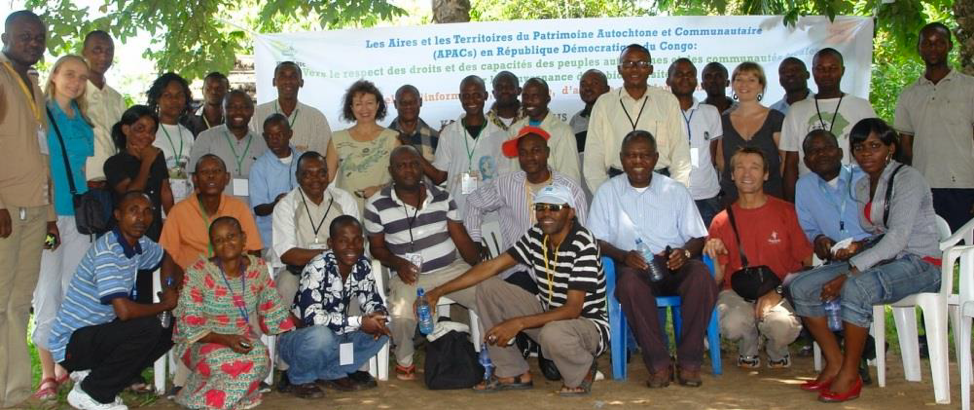First published on 01/06/2013, and last updated on 03/06/2018
By: Christian Chatelain, Regional Coordinator for West & Central Africa
The workshop « Indigenous Peoples’ and Community Conserved Areas and Territories (ICCAs) in Democratic Republic of Congo: towards respecting indigenous peoples’ and local communities’ rights for biodiversity governance » took place in Kinshasa, Democratic Republic of Congo (DRC) from November 5th to November 9th. The network of indigenous peoples and local communities for the sustainable management of forest ecosystems in the DRC (REPALEF-DRC), the ICCA Consortium and the GIZ originated, organised and provided support to this five-day workshop. With the ICCA concept and practices at its core, the work of the 37 participants – many of them representing indigenous peoples and local communities from the 11 provinces of the country– focused on information, exchanges, analysis and initial planning. Two representatives of the ICCA Consortium visited Kinshasa to facilitate the workshop and provide technical reference (documents, presentations, tools, etc.) and support. All the provinces of Congo– North Kivu, Maniema, South Kivu, Province Orientale, Kasai Occidental, Kasai Oriental, Bandundu, Equateur, Katanga province and the city of Kinshasa—were well represented.
A main objective of the workshop was to assess the relevance and applicability of the concept and practice of ICCAs in the DRC. This was promptly confirmed by numerous recounted experiences stressing that – indeed— ICCAs are alive and well in the minds and collective consciousness of people… In fact, they are stated as normally much more effective than official conservation practice (such as protected areas) in terms of conserving biological and cultural diversity. Another objective was to explore how to anchor the concept and practice of ICCAs in the DRC and, possibly in the future, in the overall Central African region.
The workshop took-off from presentations of cultural practices and institutions for the governance, management and conservation of natural resource in all provinces of the country, based on a set of questions sent in advance. Following that, some basic and historical information was provided on conservation of natural and cultural environments, but also on broad current threats to them. ICCAs were then introduced as a phenomenon characteristic of relations between indigenous peoples and local communities (PAs & CLs) and their environments throughout the world. One hundred and fifty copies of a volume, originally published in 2010 – were reprinted especially for the workshop in Kinshasa and distributed to participants for dissemination in the field. The volume is entitled
“Bio-cultural diversity conserved by indigenous peoples and local communities – examples and analysis” and is available in three languages from the ICCA website.
The workshop offered opportunities for the Consortium staff to interact with its member REPALEF and key national partners, such as the GEF-SGP’s representative in DRC, Mr. Célestin Kabeya, the WWF Advisor on Indigenous Peoples, Mr. Mpia Bikopo, and the Director of GIZ’s Programme on Biodiversity and Forests in RDC, Mr. Andreas Schleenbaecker. The workshop enabled to recruit a new coordinator for the Consortium: Joseph Itwonga, now Regional Coordinator for Forest Ecosystems of Central Africa. Joseph is an indigenous Walikale from North Kivu (DRC) and coordinator of the Consortium’s Member REPALEF-RDC.
An immediate result of the workshop, which was enthusiastically expressed by the workshop participants, is a very welcome “new awareness” of the concept and practice of ICCAs in DRC and of their value for national conservation and sustainable livelihoods policies and for more respectful approaches to the rights of indigenous peoples and local communities. This new strategic understanding opened the way to the establishment of a roadmap for a better recognition and support to ICCAs in the country, with objectives at national and provincial level.
Recommendations were issued at the end of the workshop addressing the relevant ministries, partners and civil society and REPALEF itself. The relevant ministries should support the process of recognition of ICCAs as a mode of governance and management crucial for the lives of indigenous peoples and local communities and as a strategy for environmental conservation and sustainable use of natural resources. Partners should support efforts by indigenous peoples and local communities to initiate a process of recognition of some of their territories as ICCAs. REPALEF and its collaborators should engage with strength and conviction in the process leading to the formal recognition of ICCAs in DRC (and beyond, via REPALEAC, which is the “brother network” of REPALEF for Central Africa).
The workshop closed with the proclamation of a “Kinshasa Declaration“, marking the start of a political (in the best sense of the term) process towards such appropriate recognition and support to ICCAs in the DRC.
